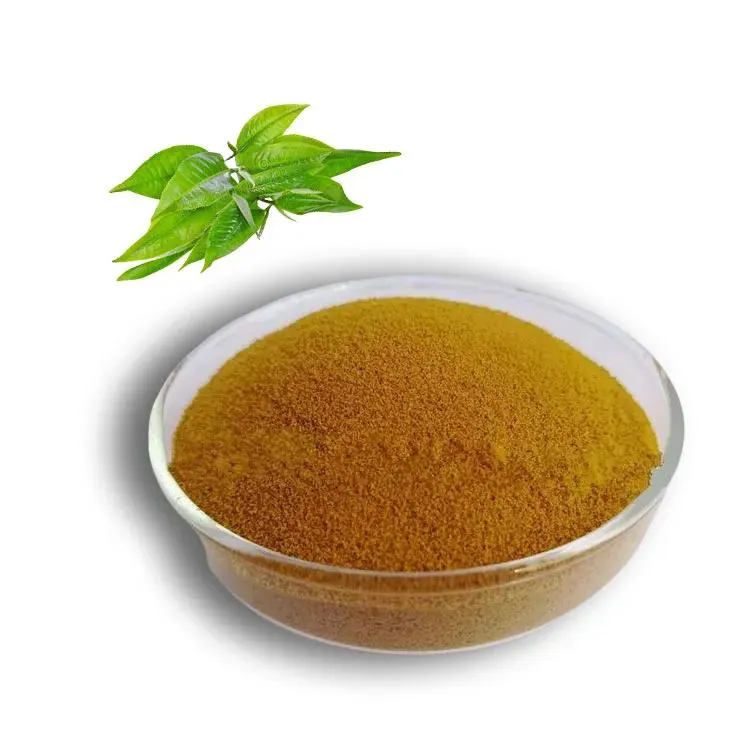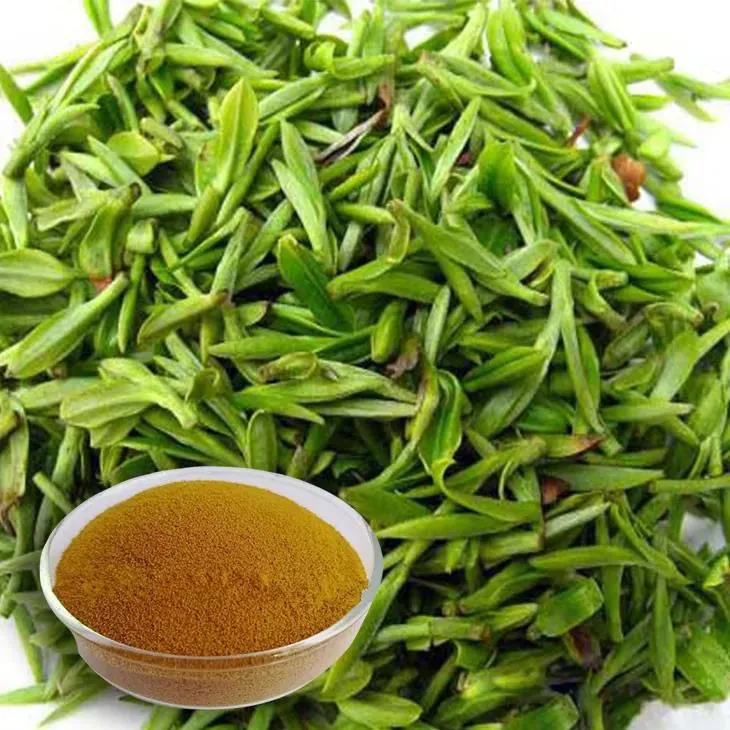- 0086-571-85302990
- sales@greenskybio.com
The Best Herb for Treating Anxiety and Insomnia: Green Tea Extract.
2024-11-13

1. Introduction
Anxiety and insomnia are two common health issues that can significantly impact a person's quality of life. In the search for natural remedies, Green Tea Extract has emerged as a potential candidate. This article aims to explore the reasons why Green Tea Extract may be the best herb for treating anxiety and insomnia, looking at its chemical composition, real - life evidence, and proper usage.

2. Chemical Composition of Green Tea Extract and Its Interaction with the Body
Green tea extract is rich in various bioactive compounds, which play important roles in interacting with the body's biochemistry.
2.1 Catechins
Catechins, particularly epigallocatechin - 3 - gallate (EGCG), are the most abundant polyphenols in green tea extract. EGCG has antioxidant properties that can help protect the body from oxidative stress. Oxidative stress has been associated with various mental health disorders, including anxiety. By reducing oxidative stress, EGCG may contribute to a more balanced mental state.
Moreover, catechins can also interact with neurotransmitters in the brain. They may influence the levels of serotonin, dopamine, and gamma - aminobutyric acid (GABA). Serotonin is often referred to as the "feel - good" neurotransmitter, and its proper regulation is crucial for mood stability. An imbalance in serotonin levels can lead to anxiety and depression. Catechins may help regulate serotonin levels, thereby alleviating anxiety symptoms.
2.2 L - Theanine
Another important component in green tea extract is L - theanine. L - theanine has a unique ability to cross the blood - brain barrier. Once in the brain, it can increase the production of alpha - waves, which are associated with a state of relaxation. This is similar to the effects of meditation.
L - theanine also has an impact on neurotransmitters. It can enhance GABA activity in the brain. GABA is an inhibitory neurotransmitter that helps to calm the nervous system. By increasing GABA activity, L - theanine can reduce anxiety and promote better sleep. Additionally, L - theanine can work in synergy with caffeine present in green tea. Caffeine is a stimulant, but when combined with L - theanine, it can produce a more balanced effect, reducing the jittery feeling often associated with caffeine alone and providing a gentle energy boost without causing excessive arousal.

3. Real - Life Cases and Research Findings
3.1 Case Studies
There have been several case studies that suggest the effectiveness of green tea extract in treating anxiety and insomnia.
- In one case, a middle - aged woman suffering from chronic anxiety and mild insomnia started consuming green tea extract on a daily basis. After a few weeks, she reported a significant reduction in her anxiety levels. She felt more relaxed during the day and was able to fall asleep more easily at night.
- Another case involved an elderly man who had difficulty sleeping. He incorporated green tea extract into his daily routine. Over time, he noticed an improvement in his sleep quality. He woke up less frequently during the night and felt more refreshed in the morning.
3.2 Research Studies
Several research studies have also been conducted to evaluate the efficacy of green tea extract.
- A study published in a leading journal found that participants who took green tea extract supplements for a certain period had lower levels of anxiety - related hormones compared to the control group. The researchers attributed this to the catechins and L - theanine present in the extract.
- Another research project focused on the sleep - promoting effects of green tea extract. The results showed that it could help regulate the body's circadian rhythm, which is essential for a good night's sleep. The combination of L - theanine and other bioactive compounds in the extract was thought to be responsible for this effect.

4. Proper Dosage and Possible Side Effects
4.1 Dosage
The proper dosage of green tea extract for treating anxiety and insomnia can vary depending on several factors, such as age, overall health, and the severity of the condition.
- For general use, a dosage of 200 - 400 mg of green tea extract per day, which contains a significant amount of catechins and L - theanine, may be effective. However, it is always advisable to start with a lower dose and gradually increase it if necessary.
- It is also important to note that the form of the extract can affect the dosage. For example, if it is in a concentrated form, a lower dose may be sufficient compared to a less concentrated product.
4.2 Side Effects
While green tea extract is generally considered safe, there are some possible side effects to be aware of.
- One potential side effect is gastrointestinal discomfort. Some people may experience nausea, stomach cramps, or diarrhea when taking green tea extract, especially if they take it on an empty stomach or in excessive amounts.
- Green tea extract also contains caffeine, although in smaller amounts compared to coffee. For individuals who are sensitive to caffeine, it may cause symptoms such as restlessness, increased heart rate, or difficulty sleeping if taken too close to bedtime.
- In rare cases, green tea extract may interact with certain medications. For example, it may interfere with the absorption or effectiveness of blood - thinning medications. Therefore, it is crucial to consult a healthcare provider before starting to use green tea extract, especially if you are taking any medications.
5. Conclusion
Green tea extract shows great potential as an herbal remedy for anxiety and insomnia. Its chemical composition, including catechins and L - theanine, interacts with the body's biochemistry in ways that can relieve anxiety and improve sleep quality. Real - life cases and research findings further support its efficacy. However, it is important to use it properly, taking into account the proper dosage and being aware of possible side effects. By doing so, green tea extract can be a valuable addition to the management of anxiety and insomnia, offering a natural alternative to traditional medications.
FAQ:
What are the main chemical components in green tea extract that can relieve anxiety and improve sleep?
Green tea extract contains several important components. L - theanine is one of the key substances. It can cross the blood - brain barrier and increase the levels of GABA (gamma - aminobutyric acid), a neurotransmitter that has a calming effect on the brain. Additionally, catechins in green tea extract may also play a role through their antioxidant and anti - inflammatory properties, which can help regulate the body's overall physiological state and potentially contribute to reducing anxiety and improving sleep.
Can you give some real - life examples of using green tea extract to treat anxiety and insomnia?
There are some anecdotal reports. For example, some people who regularly consume green tea or green tea - based supplements have noticed a reduction in their daily stress levels, which is often related to anxiety. They feel more relaxed and are able to fall asleep more easily at night. However, it should be noted that these are individual experiences and may vary from person to person.
What are the research findings on the efficacy of green tea extract for anxiety and insomnia?
Several studies have been conducted. Some research has shown that in animal models, the administration of green tea extract or its active components can lead to a decrease in anxiety - like behaviors. In human studies, while the results are not completely conclusive, there are indications that green tea extract may have a positive impact on sleep quality. For instance, participants who consumed green tea extract over a certain period reported feeling less restless at night and having a more restful sleep, but more large - scale and long - term studies are still needed.
What is the proper dosage of green tea extract for treating anxiety and insomnia?
The proper dosage can vary depending on various factors such as age, gender, and overall health. Generally, for adults, a daily dosage of around 200 - 400 mg of green tea extract (containing a certain percentage of active ingredients like L - theanine) may be considered. However, it is crucial to consult a healthcare professional before starting any supplementation regimen, as they can provide personalized advice based on an individual's specific situation.
What are the possible side effects of using green tea extract for these conditions?
Some possible side effects include stomach upset, nausea, and in some cases, it may cause an increase in heart rate due to its caffeine content. Also, if a person is sensitive to certain components in green tea extract, they may experience allergic reactions such as skin rashes or itching. It's important to monitor the body's response when starting to use green tea extract and stop if any adverse effects occur.
Related literature
- The Effects of Green Tea Extract on Anxiety and Sleep: A Review"
- "Green Tea and its Bioactive Compounds: Potential in Anxiety and Insomnia Management"
- "Role of Green Tea Extract in Modulating the Nervous System for Anxiety and Sleep Disorders"
- ▶ Hesperidin
- ▶ citrus bioflavonoids
- ▶ plant extract
- ▶ lycopene
- ▶ Diosmin
- ▶ Grape seed extract
- ▶ Sea buckthorn Juice Powder
- ▶ Beetroot powder
- ▶ Hops Extract
- ▶ Artichoke Extract
- ▶ Reishi mushroom extract
- ▶ Astaxanthin
- ▶ Green Tea Extract
- ▶ Curcumin Extract
- ▶ Horse Chestnut Extract
- ▶ Other Problems
- ▶ Boswellia Serrata Extract
- ▶ Resveratrol Extract
- ▶ Marigold Extract
- ▶ Grape Leaf Extract
- ▶ blog3
-
Cranberry Plants and Skin - care Products.
2024-11-13
-
Propolis Extract Powder
2024-11-13
-
Saponin Extract
2024-11-13
-
Honeysuckle Pollen
2024-11-13
-
Polygonum multiflorum extract
2024-11-13
-
Beetroot Powder
2024-11-13
-
Acerola Extract
2024-11-13
-
Curcuma Longa Extract/Turmeric extract
2024-11-13
-
Maca Extract
2024-11-13
-
Oat Straw Extract Powder
2024-11-13
-
Pomegranate Extract
2024-11-13





















